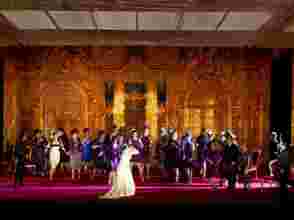Nikolai Rimsky-Korsakov - The Tsar's Bride (1972)
Nikolai Rimsky-Korsakov - The Tsar's Bride (1972)

1. Part I 2. Part II Vasily Stepanovich Sobakin, Novgorodian merchant – Igor Novoloshnikov Marfa, his daughter – Galina Kovaleva Grigory Gryaznoy, an oprichnik – Vladimir Kinyaev Malyuta Skuratov, an oprichnik – Vladimir Morozov Boyar Ivan Sergeyevich Lïkov – Mikhail Egorov Lyubasha – Irina Bogachova Yelisey Bomelius, the Tsar's physician – Ivan Bugaev Choir and Orchestra of Kirov Academic Theatre and Ballet Viktor Fedotov – conductor Radio Broadcast from Mariinsky Theatre, 30.12.1972
The text for The Tsar's Bride is by Lev Alexandrovich Mey (1822 - 1862), who was, for a time, a very popular playwright with a predilection for historical dramas based on lives of the tsars. Two of these plays concerned Tsar Ioann IV, known as Ivan the Terrible. Rimsky-Korsakov set both of these to music.
In an 1825 book, Russian historian Ivan Karamzin describes how Tsar Ivan the Terrible chose his third bride, Marfa Sobakina, out of over two thousand women. Her family was raised to the level of nobility and made wealthy. Marfa died two weeks after the wedding. Karamzin suggests Marfa's demise involved treachery and poison. Mey took this account and ran, filling in the holes to create his play, The Tsar's Bride, in 1849. Rimsky-Korsakov became interested in Mey's The Tsar's Bride in 1891 and he began composing slowly and methodically. Although the opera was planned in the grandest manner for the Imperial Theaters, it had to receive its premiere at a small theater under private sponsorship. On October 30, 1901, nearly two years after its first performance, it finally appeared on the Imperial stage.
In many ways, the opera is unlike earlier works by Rimsky-Korsakov. With The Tsar's Bride, the composer deliberately chose to create a "number" opera that concentrated on singing. In fact, Lykov's aria was composed at the request of the singer who played the part at the first performance. It is a conventional work in the grand manner with a symphonic overture, arias for all the principal roles, and numerous choruses. In these respects, it resembles Alexander Borodin's Prince Igor, which Rimsky-Korsakov had completed in 1891. The blatantly "old-fashioned" vocal style of The Tsar's Bride is in part a result of Rimsky-Korsakov's composition of romances and duets during the summer of 1897 with the intention of recapturing the traditional "lyric" style with which he felt he had lost touch. Other characteristics associated with earlier music abound, such as the fugal chorus for the Oprichniki during the banquet in Act I and the counterpoint that seems to permeate most of the ensembles.
Rimsky-Korsakov's use of Leitmotivs in The Tsar's Bride is more akin to Verdi's approach than Wagner's, serving more as reminiscences than as identifying tags. One Leitmotiv that does serve as identification, however, is for the Tsar, a non-singing role. Rimsky-Korsakov borrowed a tune associated with Ivan in his earlier The Maid of Pskov, knowing full well that his audience would make the connection.
Some characteristics of the old Rimsky-Korsakov remain, especially in numbers that would have been perceived as being derived from Russian folk song. The most prominent of these is Lyubasha's gloomy solo in the first act, which is sung unaccompanied except for a returning passage. Rimsky-Korsakov infuses the moments of greatest suspense with unusual harmonic progressions, most notably in Gryaznoy's at the beginning of Act I and Marfa's descent into madness at the end of the opera. ---John Palmer, Rovi
download:








